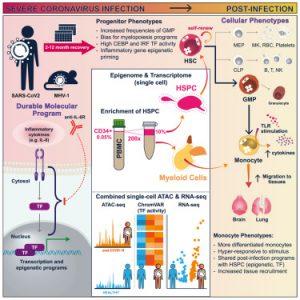In a recent study, researchers have uncovered how severe cases of COVID-19 can lead to enduring alterations in the innate immune system (Figure 1). These changes shed light on why the disease can wreak havoc on various organs and why individuals with long COVID often experience persistent systemic inflammation.
The study involved the analysis of immune cells and molecules in blood samples from individuals recovering from severe COVID-19.
Within a rare form of stem cells, the study identified changes in gene regulation that influenced the production of monocytes. Individuals recovering from severe COVID-19 exhibited gene expression changes that led their monocytes to produce higher levels of inflammatory cytokines compared to healthy individuals or those recovering from non-COVID-19 illnesses. These observations persisted long-term.
In mouse experiments, subjects who received antibodies in the early stages of illness, preventing IL-6 from binding to cells, displayed reduced levels of altered stem cell gene expression, lower monocyte production, and diminished inflammatory cytokine levels during recovery.
These findings suggest that SARS-CoV-2 infection can induce gene expression changes that amplify inflammatory cytokine production. Furthermore, they indicate that early intervention targeting IL-6 may serve as a critical strategy for curbing long-term inflammation in individuals with severe COVID-19.
Journal article: Cheong, J-G., et al. 2023. Epigenetic memory of coronavirus infection in innate immune cells and their progenitors. Cell.
Summary by Stefan Botha











